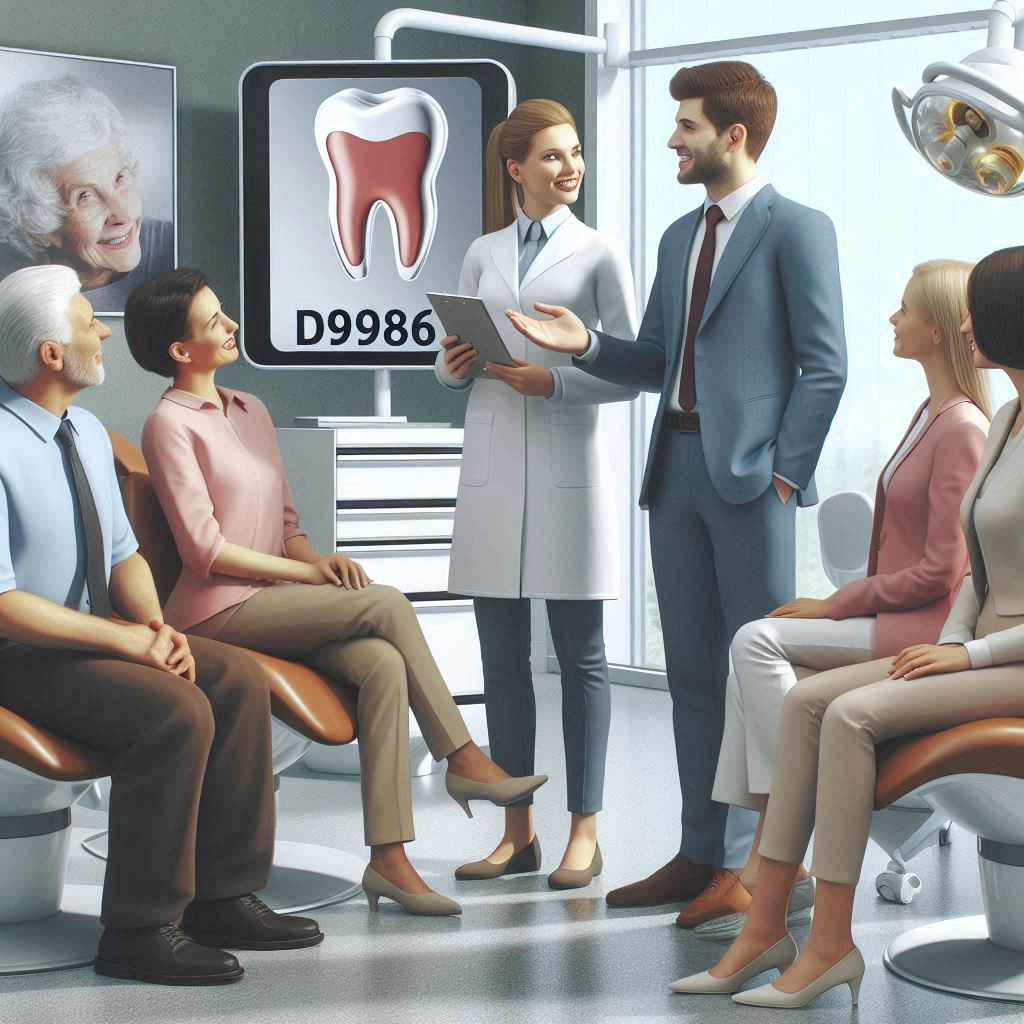D9986 Dental Code
The D9986 dental code is a specific billing code used in dental practices to document and bill for services related to missed appointments. This code falls under the “Adjunctive General Services” category in the American Dental Association (ADA) Current Dental Terminology (CDT) code set. It is designed to address the administrative and financial challenges that dental practices face when patients fail to show up for scheduled appointments without prior notice.
The D9986 code is unique because it allows dental offices to bill for the time and resources lost due to a missed appointment. While it is not a treatment code, it plays a critical role in practice management by helping dental offices recover some of the costs associated with no-shows.

D9986 Dental Code Description
The D9986 dental code is described as a “missed appointment” code. It is used when a patient fails to attend a scheduled dental appointment without providing adequate notice. This code is not tied to any specific dental procedure but rather serves as a tool for dental practices to manage their schedules and finances more effectively.
Key Features of D9986:
- Non-Clinical Use: Unlike other CDT codes, D9986 does not represent a clinical procedure. Instead, it is an administrative code used to document missed appointments.
- Financial Recovery: The code allows dental practices to bill patients for the time and resources lost due to a no-show.
- Practice Management: By using this code, dental offices can discourage missed appointments and improve scheduling efficiency.
When to Use D9986:
- The patient fails to show up for a scheduled appointment.
- The patient cancels the appointment at the last minute (e.g., less than 24 hours before the scheduled time).
- The dental office has a clear policy in place regarding missed appointments, and the patient has been informed of this policy.
D9986 Dental Code Meaning
The D9986 dental code holds significant meaning for both dental practices and patients. For dental offices, it represents a way to mitigate the financial impact of missed appointments. For patients, it serves as a reminder of the importance of keeping scheduled appointments and respecting the time of dental professionals.
Importance for Dental Practices:
- Financial Impact: Missed appointments can result in significant revenue loss for dental practices. By using the D9986 code, offices can recover some of these losses.
- Operational Efficiency: No-shows disrupt the schedule, leading to wasted time and resources. The D9986 code helps practices maintain better control over their schedules.
- Patient Accountability: Charging for missed appointments encourages patients to take their scheduled visits more seriously.
Importance for Patients:
- Awareness: The use of the D9986 code highlights the consequences of missing appointments without notice.
- Transparency: Patients are made aware of the financial and operational impact of their actions.
- Encouragement: It encourages patients to communicate with the dental office if they need to reschedule or cancel an appointment.
D9986 Dental Code Reimbursement
Reimbursement for the D9986 dental code varies depending on the dental office’s policies and the patient’s insurance plan. Since this code is not tied to a clinical procedure, it is typically not covered by dental insurance. Instead, the cost is usually billed directly to the patient.
Factors Affecting Reimbursement:
- Office Policy: Each dental office sets its own fee for missed appointments. This fee is often outlined in the patient’s consent form or appointment confirmation.
- Insurance Coverage: Most insurance plans do not cover administrative codes like D9986. Patients are usually responsible for paying the fee out-of-pocket.
- State Regulations: Some states have specific regulations regarding fees for missed appointments. Dental offices must ensure compliance with these regulations.
Example of Reimbursement Process:
| Step | Action |
|---|---|
| 1 | Patient misses an appointment without notice. |
| 2 | Dental office documents the missed appointment using the D9986 code. |
| 3 | Office bills the patient for the missed appointment fee (e.g., $50). |
| 4 | Patient pays the fee directly to the dental office. |
Conclusion
The D9986 dental code is a valuable tool for dental practices to manage missed appointments and recover lost revenue. By understanding its definition, description, meaning, and reimbursement process, dental professionals can use this code effectively to improve practice efficiency and patient accountability.
FAQs
- What is the D9986 dental code used for?
The D9986 code is used to bill patients for missed appointments. - Does insurance cover the D9986 code?
No, most insurance plans do not cover administrative codes like D9986. Patients are typically responsible for the fee. - How much does a missed appointment cost?
The cost varies by dental office but is usually between 25and25and100. - Can a dental office waive the D9986 fee?
Yes, some offices may waive the fee for first-time offenders or under special circumstances. - Is the D9986 code mandatory?
No, its use depends on the dental office’s policies.
Additional Resources
- American Dental Association (ADA): www.ada.org
- Current Dental Terminology (CDT) Code Set: ADA CDT Codes
- Dental Practice Management Tips: Dental Economics


